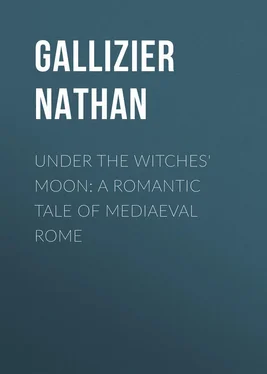Nathan Gallizier - Under the Witches' Moon - A Romantic Tale of Mediaeval Rome
Здесь есть возможность читать онлайн «Nathan Gallizier - Under the Witches' Moon - A Romantic Tale of Mediaeval Rome» — ознакомительный отрывок электронной книги совершенно бесплатно, а после прочтения отрывка купить полную версию. В некоторых случаях можно слушать аудио, скачать через торрент в формате fb2 и присутствует краткое содержание. Издательство: Иностранный паблик, Жанр: foreign_antique, foreign_prose, на английском языке. Описание произведения, (предисловие) а так же отзывы посетителей доступны на портале библиотеки ЛибКат.
- Название:Under the Witches' Moon: A Romantic Tale of Mediaeval Rome
- Автор:
- Издательство:Иностранный паблик
- Жанр:
- Год:неизвестен
- ISBN:нет данных
- Рейтинг книги:4 / 5. Голосов: 1
-
Избранное:Добавить в избранное
- Отзывы:
-
Ваша оценка:
- 80
- 1
- 2
- 3
- 4
- 5
Under the Witches' Moon: A Romantic Tale of Mediaeval Rome: краткое содержание, описание и аннотация
Предлагаем к чтению аннотацию, описание, краткое содержание или предисловие (зависит от того, что написал сам автор книги «Under the Witches' Moon: A Romantic Tale of Mediaeval Rome»). Если вы не нашли необходимую информацию о книге — напишите в комментариях, мы постараемся отыскать её.
Under the Witches' Moon: A Romantic Tale of Mediaeval Rome — читать онлайн ознакомительный отрывок
Ниже представлен текст книги, разбитый по страницам. Система сохранения места последней прочитанной страницы, позволяет с удобством читать онлайн бесплатно книгу «Under the Witches' Moon: A Romantic Tale of Mediaeval Rome», без необходимости каждый раз заново искать на чём Вы остановились. Поставьте закладку, и сможете в любой момент перейти на страницу, на которой закончили чтение.
Интервал:
Закладка:
There lived in a palace, built upon the ruins of nameless temples and sanctuaries, and embellished with all the barbarous splendor of Byzantine and Moorish arts, in the remote wilderness of Mount Aventine, a woman, who, in point of physical charms, ambition and daring had not her equal in Rome since the death of Marozia. Theodora the younger, as she is distinguished from her mother, the wife of Theophylactus, by contemporary chroniclers, was the younger sister of Marozia.
The boundless ambition of the latter had left nothing to achieve for the woman who had reached her thirtieth year when Alberic's revolution consigned her sister to a nameless doom.
Strange rumors concerning her were afloat in Rome. Strange things were whispered of her palace on Mount Aventine, where she assembled about her the nobility of the city and the surrounding castelli, and soon her court vied in point of sumptuousness and splendor with the most splendid and profligate of her time.
Her admirers numbered by thousands, and her exotic beauty caused new lovers to swell the ranks of the old with every day that passed down the never returning tide of time.
Some came openly and some came under the cover of night, heavily muffled and cloaked: spendthrifts, gamblers, gallants, men of fashion, officers of the Senator's Court, poets, philosophers, and the feudal lords of the Campagna.
Wealthy debauchees from the provinces, princes from the shores of the Euxine, Lombard and Tuscan chiefs, Northmen from Scandinavia and Iceland, wearing over their gnarled limbs the soft silken tunics of Rome, Greeks, sleek, furtive-eyed, rulers from far-off Cathay, wearing coats of crimson with strange embroidery from the scented East, men from the isles of Venetia and the stormy plains of Thessaly, men with narrow slanting eyes from the limitless steppes of Sarmatia, blond warriors from the amber coasts of the Baltic, Persian princes who worshipped the Sun, and Moors from the Spanish Caliphate of Cordova; chieftains from the Lybian desert, as restive as their fiery steeds; black despots from the hidden heart of Africa, with thick lips and teeth like ivory, effete youths from Sicily and the Ionian isles, possessed of the insidious beauty of the Lesbian women, adventurers from Samarkand and Bokhara, trading in strange wares and steeped in odor of musk and spices; Hyperboreans from the sea-skirt shores of an ever frozen unimaginable ocean; – from every land under the sun they came to Rome, for the sinister fame of Theodora's beauty, the baleful mystery that surrounded her, and her dark repute proved powerful incentives to curiosity, which soon gave way to overmastering passion, once the senses had been steeped in the intoxicating atmosphere of the woman's presence.
And, indeed, her physical charms were such as no mortal had yet resisted whom she had willed to make her own. Her body, tall as a column, was lustrous, incomparable. The arms and hands seemed to have been chiselled of ivory by a master creator who might point with pride to the perfection of his handiwork – the perfection of Aphrodité, Lais and Phryne melted into one. The features were of such rare mould and faultless type that even Marozia had to concede to her younger sister the palm of beauty. The wonderful, deep set eyes, with their ever changing lights, now emerald, now purple, now black; the straight, pencilled brows, the broad smooth forehead and the tiny ears, hidden in the wealth of her raven hair, tied into a Grecian knot and surmounted by a circlet of emeralds, skillfully worked into the twining bodies of snakes with ruby eyes; the satin sheen of the milk-white skin whose ivory pallor was tinted with the faintest rose-light that never changed either in heat or in cold, in anger or in joy: such was the woman whose long slumbering, long suppressed ambition, coupled with a daring that had not its equal, was to be fanned into a raging holocaust after Marozia's untimely demise.
Concealing her most secret hopes and ambitions so utterly that even Alberic became her dupe, Theodora threw herself into the whirl of life with a keen appreciation of all its thrilling excitement. Vitally alive with the pride of her sex and the sense of its power, she found in her existence all the zest of some breathlessly fascinating game. Men to her were mere pawns. She regarded them almost impersonally, as creatures to taunt, to tempt, to excite, to play upon. Deliberately and unstintingly she applied her arts. She delighted to see them at her feet, but to repel them as the mood changed, with exasperating disdain. Love to her was a word she knew but from report, – or, from what she had read. She knew not its meaning, nor had she ever fathomed its depths.
To revel through delirious nights with some newly-chosen favorite of the moment, who would soon thereafter mysteriously disappear, to be tossed from the embrace of one into the arms of another; in the restless, fruitless endeavor to kill the pain of life, the memory of consciousness, to fill the void of a heart, that, alive to the shallowness of existence, clutches at the saving hope of power, to rule and to crush the universe beneath her feet, a dream, vague, vain, unattainable: this desire filled Theodora's soul.
Her soul was burning itself to cinders in its own fires, – those baleful fires that had proven the undoing of her equally beautiful sister.
Alone she would pace her gilded chambers, feverishly, unable to think, driven hither and thither by the demons of unrest, by the disquietude of her heart. Desperately she threw herself into whatever excitement offered.
But it was always in vain.
She found no respite. Ever and ever a reiterant, restless craving gnawed, like a worm, at her heart.
As she approached the thirtieth year of her life, Theodora had grown more dazzling in beauty. Her body had assumed the wonderful plasticity of marble. Her eyes had become more unfathomable, more wondrously changeful in hues, like the iridescent waters of the sea.
Living as she did in an age where a morbid trend pervaded the world, where the approach of the Millennium, though no one of the present generation would see the day, was heralded as the End of Time; living as she did in the darkest epoch of Roman history, Theodora felt the utter inadequacy of her life, a hunger which nothing but power could assuage.
Slowly this desire began to grow and expand. She wished to wield her will, not only on men's emotions, but upon their lives as well. Perhaps even the death of Marozia, with its paralyzing influence over her soul, the captivity in the Lateran of her sister's son, and the hateful rule of Alberic, would not have brought matters to a focus, had not the appearance upon the stage of a woman, who, in point of beauty, spirit and daring bade fair to constitute a terrible rival, roused all the dormant passions in Theodora's soul and when Roxana openly boasted that she would wrest the power from the hands of her rival and rule in the Emperor's Tomb in spite of the Pontiff, of Alberic and Marozia's blood-kin, the soul of Theodora leaped to the challenge of the other woman and she craved for the conflict as she had never longed for anything in her life, save perchance, a love of which she had but possessed the base counterfeit.
No one knew whence Roxana had come, nor how long she had been in Rome, when an incident at San Lorenzo in Lucina had brought the two women face to face. Both, with their trains, had simultaneously arrived before the portals of the sanctuary when Roxana barred Theodora's way. Some mysterious instinct seemed to have informed each of the person and ambition of the other. For a moment they faced each other white to the lips. Then Roxana and her train had entered the church, and as she passed the other woman, a deadly challenge had flashed from her blue eyes into Theodora's dark orbs. The populace applauded Roxana's daring, and, in order to taunt her rival, she had established her court on desert Aventine, assembling about her the disgruntled lovers of Theodora and others, whom her disdain had driven to seek oblivion and revenge.
Читать дальшеИнтервал:
Закладка:
Похожие книги на «Under the Witches' Moon: A Romantic Tale of Mediaeval Rome»
Представляем Вашему вниманию похожие книги на «Under the Witches' Moon: A Romantic Tale of Mediaeval Rome» списком для выбора. Мы отобрали схожую по названию и смыслу литературу в надежде предоставить читателям больше вариантов отыскать новые, интересные, ещё непрочитанные произведения.
Обсуждение, отзывы о книге «Under the Witches' Moon: A Romantic Tale of Mediaeval Rome» и просто собственные мнения читателей. Оставьте ваши комментарии, напишите, что Вы думаете о произведении, его смысле или главных героях. Укажите что конкретно понравилось, а что нет, и почему Вы так считаете.












